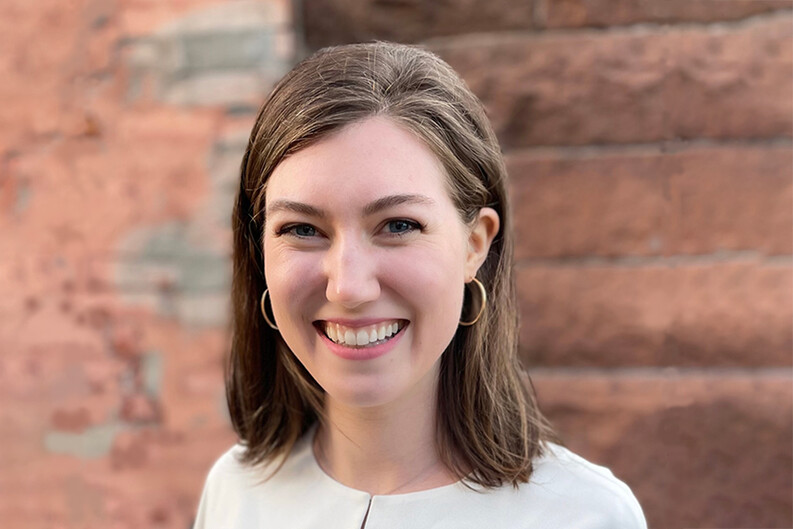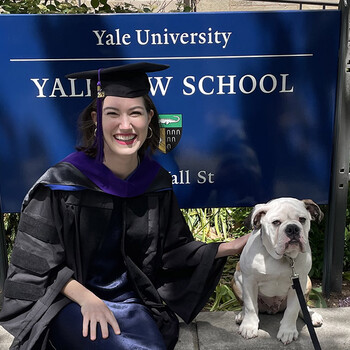Q&A: Liman Fellow Allison Durkin ’21 on Challenging Flawed Forensic Science

Allison Durkin ’21, a 2021–22 Liman Fellow4 with the Legal Aid Society of New York, works in the DNA Unit of the Criminal Defense Practice. Her project aims to challenge forensic biological testing techniques that contribute to the wrongful convictions of New Yorkers.
Durkin is a 2016 graduate of Yale College and a 2021 graduate of Yale Law School, where she was a Coker Fellow and a member of the Criminal Justice Advocacy Clinic, the Pediatric Care Medical-Legal Partnership, and the Clinical Student Board. She also served on the board of the Thomas Swan Barristers’ Union and the Yale Health Law and Policy Society. Prior to law school, Durkin worked at the Seaver Autism Center for Research and Treatment at Mount Sinai in New York.
Durkin answered questions about her experience as a Liman Fellow and her work.
Q: Why did you apply to become a Liman Fellow?

A: As a cognitive science major in college, I learned how flawed forensic science could be. The Innocence Project has reported5 that forensic science has contributed to half of all the wrongful convictions in their cases, and one quarter of all known wrongful convictions nationally. In 2009, the National Research Council issued a landmark report6 that debunked the reliability of nearly every type of forensic test, from toolmark to fingerprint analysis.
Even DNA testing, the one forensic test developed for medicine instead of courtrooms, is far from foolproof. Despite all that we know today, the legal system continues to use flawed and untested technologies to incarcerate people. Compounding the issue are new, experimental DNA technologies that are entering the legal system. The government is purchasing these tools from private companies [that] keep how they work secret, even from the accused.
After taking part in clinics and Professor Fiona Doherty’s course on sentencing at YLS, I more deeply understood the harms that flawed technology can wreak on individuals and communities. I applied to become a Liman Fellow to chip away at the architecture that allows this system to continue. The Liman Fellowship represented an extraordinary opportunity to work immediately on these issues, to gain training from legal experts, and to become connected with a network of graduates dedicated to legal reform.
Tell us more about your project at the Legal Aid Society of New York.
I am working with the DNA Unit, which supports the Juvenile Rights and Criminal Defense Practices through litigation and policy advocacy. Because I worked in clinical genetic research prior to law school, I have experience with DNA testing.
My fellowship project involves three parts. First, I am developing model litigation materials to help Legal Aid attorneys access information about new, algorithmic DNA testing methods that the government employs in criminal investigations. Like any algorithm, these tools are prone to human bias and error. Developers of these tools assert that the methods are trade secrets, which courts should not permit the defense to inspect. My project leverages recent cases that have held in favor of the defense’s need to review the underlying methodologies to present a complete defense.
Second, I am writing a white paper regarding an emerging DNA technology called forensic DNA phenotyping (FDP). FDP purports to predict what individuals look like — including their eye color, skin color, facial morphology, and age — using only their DNA. Although scientists have characterized many FDP tools as science fiction, police are already utilizing these experimental FDP tools in criminal investigations to attempt to identify unknown persons. FDP not only risks inaccurate predictions but enhances racial profiling and stigmatization for Legal Aid’s clients.
Third, I am assisting with litigation matters. This work ranges from preparing for suppression hearings to developing a class action. It has been surreal to be involved in litigating novel issues that I previously had only learned about in the classroom.
Have there been any surprises?
Only a few months into my fellowship, the Liman community has already been extraordinarily warm and supportive. Although I am not exactly surprised, I am very grateful.
What kind of impact do you hope to have during your fellowship year?
Experimental and flawed technologies should have no place in our criminal legal system. I hope this project will lay the groundwork for future litigation and policy advocacy.
The Arthur Liman Center for Public Interest Law7 promotes access to justice and the fair treatment of individuals and groups seeking to use the legal system. Through research projects, teaching, fellowships, and colloquia, the Liman Center supports efforts to bring about a more just legal system.


